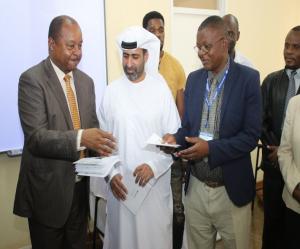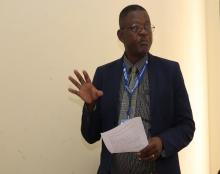Zimbabwe Launches Mental Health Strategy
The Ministry of health and Child Care (MOHCC) launched a Mental Health strategy to cover the period 2019- 2023. This comes at a time when the Ministry of Health and Child Care is moving with the global thrust to promote early identification, treatment, rehabilitative and palliative services in non-communicable diseases (NCDs).
The strategy is a culmination of the effort of many stakeholders in mental health and WHO provided technical assistance. The strategy was launched by the Minister of Health and Child Care Dr Obadiah Moyo and will enable the country to fulfill the objectives of the National Health Strategy 2016-2020. The strategy was launched at a time when the country is facing a potential for a big demand for mental health services in terms of need for counseling of clients who will be suffering from post-traumatic stress disorders as a result of cyclone Idai which devastated the eastern provinces of the country. However, despite the country now having a clear blue print for mental health, it was noted by the Deputy Director, Mental Health Dr Rwafa, that the country still faces a lot of challenges in the implementation of the strategy. The key challenges are on human resources for health with the country having only 15 practicing psychiatrists. It was however noted that the government has created a provincial mental health post which will allow the Ministry to beef up manpower to implement the strategy. The Ministry of Health has also set up the Mental Health Training School for nurses at Parirenyatwa Hospital to train more nurses in mental health at primary care level.
Training on the mhGAP was done with support from WHO and MSF to boost human resource capacity in preparation for the implementation of the strategy. Other key issues that also came out of the launch are that the Ministry of Health is intending to review the Mental Health Act during the implementation of the strategy. They also intend to strengthen the use of the Friendship bench which is a concept that was developed by Professor Dixon Chibanda and helps to empower the communities in the management of mental health patients. In addition, the Ministry of Health also intends to advocate for the introduction of the Alcohol levy to fund mental health and to continue with the mhGAP.
Speaking on behalf of the WHO Representative for Zimbabwe Dr Alex Gasasira, Dr Edmore Munongo NPO NCDs, hailed the strong leadership by the Ministry of Health in scaling up Mental Health services as well as putting a lot of effort in coming up with the Strategy. He also applauded the efforts made by all stakeholders in supporting the Ministry to review its old strategy and come up with a new one. He emphasized WHO’s focus on Universal Health coverage (UHC) whose emphasis is on leaving no one behind. He challenged the Mental Health Unit to rise to the occasion in meeting the challenges that lie ahead as they implement the five-year strategy. WHO reaffirmed its commitment to continue working with the the Ministry of health and partners in the implementation of the Mental Health strategy.
The occasion drew attendance from several key stakeholders within the government and private sector. The Honorable Minister of Health and Child Care, Dr Obadiah Moyo who was accompanied by the Deputy Minister of International relations from the United Arab Emirates, stressed the need for mental health practitioners to assist the victims of cyclone Idai. He reiterated the commitment of the government of Zimbabwe to bring Mental health services closer to the communities and to raise the standards of care to international level.
The academia represented by Professor Chibanda emphasized the need to implement a people and community based Friendship bench model in mental health. Testimonies were also given by recovering mental health patients.





